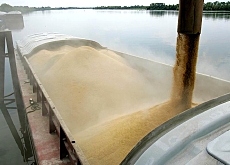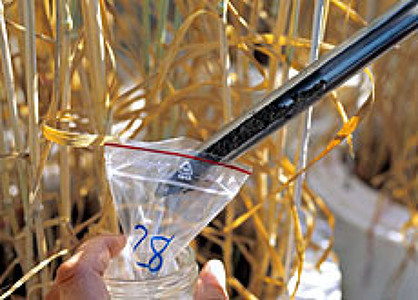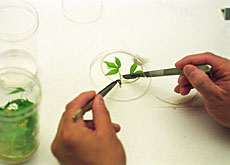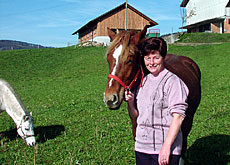Genetically modified rice hits Switzerland

The country's largest retailer Migros has confirmed finding traces of genetically modified rice, supplied from the United States, that is banned in Switzerland.
Migros says the storage silos containing the LL 601 rice have now been sealed but it is unclear whether any of the rice actually went on sale. Both Migros and rival Coop have suspended sales of long-grain rice from the US.
Migros spokesman Monica Glisenti said that traces of the unapproved rice were found after laboratory tests, adding that the concentration level was 0.01 per cent.
No genetically modified rice is permitted in Switzerland.
Glisenti said that the LL 601 rice was found in a shipment of 1,500 tons. Long-grain rice from other countries is to remain on the shelves, she said.
She noted that examination had only been possible this week because the new tests had only just become available for Migros.
As a result, it could not be ruled out that banned rice had already been sold in Switzerland.
Coop, which receives its rice from the same supplier as Migros, said it had found no traces of LL 601.
But it has also withdrawn long-grain rice from the US from the shelves, noting in a statement that contamination could not be excluded completely.
Advice
The two retailers are now waiting for advice from the Swiss Federal Health Office in Bern before taking further action. Decisions are also expected from the European Union, which has also been affected by the LL 601 rice.
The EU Commission urged EU member states and the food industry to carry out tests following the discovery of unauthorised GM rice imports in Europe.
Thirty-three out of 162 results of rice samples carried out by members of the European Federation of Rice Millers tested positive for the LL 601 strain, the European Commission said in a statement.
It also said that three bargeloads within a 20,000 metric ton US rice cargo detained in Rotterdam had tested positive, while 20 other bargeloads had tested negative.
The consignments which tested negative for the unauthorised GMO have now been allowed to proceed to their final destination, while those which tested positive continue to be detained in Rotterdam and will either be returned to the US or destroyed,” the EC said.
Tighter rules
In August, the EC tightened requirements on US long-grain rice imports to prove the absence of biotech rice strain LL 601, which it said was marketed by the Bayer company of Germany and produced in the US.
The Commission’s decision followed the discovery by US authorities of trace amounts of LL 601, engineered to resist a herbicide, in long-grain samples that were targeted for commercial use.
On Monday, environmental group Greenpeace International said a strain of LL 601 rice had been found in branches of discount supermarket Aldi Nord in Germany.
However, Aldi said no GMO rice had been found at its Aldi Nord operations.
In Frankfurt, a spokeswoman for Bayer said the company did not sell or produce LL 601. She said the strain was developed by Aventis CropScience, a company bought by Bayer in 2002, but that development had been discontinued in 2001.
The US Food and Drug Administration says that LL 601 rice poses no risk to human health and does not raise any food, safety or environmental concerns.
swissinfo with agencies
In 1998 Swiss voters overwhelmingly rejected an outright ban on GMOs.
Under a 2003 law, the Swiss parliament approved the use of GM crops under strict conditions.
Surveys have shown that consumers have little interest in GM products.
Swiss voters in November accepted a proposal for a five-year blanket ban on genetically modified organisms (GMOs) in Swiss agriculture.
The result is forcing the Swiss government to put in place some of the toughest legislation on GMOs in Europe.
The European Union, of which Switzerland is not a member, ended a six-year moratorium on accepting applications for new genetically modified foods in May 2004.
But Germany and France, two of Switzerland’s neighbours, have both voted to uphold national bans on products they deem unsafe.

In compliance with the JTI standards
More: SWI swissinfo.ch certified by the Journalism Trust Initiative



You can find an overview of ongoing debates with our journalists here. Please join us!
If you want to start a conversation about a topic raised in this article or want to report factual errors, email us at english@swissinfo.ch.